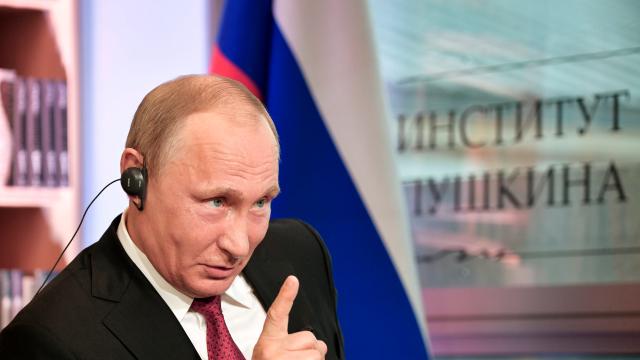Vladimir Putin, who apparently had nothing better to do today, decided to throw water on claims that Russia had direct ties to the DNC email leaks during last year’s US election. Simultaneously, the strongman who has helmed Russia for the better part of two decades endorsed the hacks as being in his country’s best interest.
Image: Alexei Nikolsky/Sputnik, Kremlin Pool Photo via AP
Before we continue, let’s recall that the three major intelligence agencies in the US — the FBI, NSA and CIA — have all claimed that Russia breached the Democratic National Committee’s networks and attempted to undermine the US election. The CIA reportedly later determined that individuals with ties to the Russian government went further than that, making a concerted effort to swing the election in Donald Trump’s favour. Got it? Good. Moving on.
On Thursday, the Associated Press reported that Putin denied that the Russian government was involved in the hacks, further gaslighting anyone within earshot by saying he could “imagine” Russia’s rivals deliberately staging “a chain of attacks in such a way as to cast Russia as the origin of such an attack”. Putin went on to state that he was “deeply convinced that no hackers can radically influence another country’s election campaign”, but made sure to add that “the Russian government is not involved with this at any level”.
But within these denials and deflections Putin put in a wink and a nod, casting hackers as good citizens with zeal and creativity:
Hackers are free people, just like artists who wake up in the morning in a good mood and start painting a painting. Likewise, hackers get up in the morning and read the news about what’s happening in international affairs. If they feel patriotic, they try to make what they see as a fair contribution to the struggle against those who speak ill of Russia. Is that possible? Yes, theoretically possible.
So can hackers contribute by attacking their homeland’s rivals? Or are they unable to influence the people of sovereign nations? Neither is really the right question, as the purpose of Putin’s comments was clearly to encourage destabilisation and electoral interference.
In a final denial, Putin — who disseminates propaganda through state TV outlets, severely limits press freedoms, and is accused of killing political opponents and critical journalists alike — stated that “no information will change the minds of the people or influence the outcome [of the election]”.
Some translation provided by Marina Galperina
